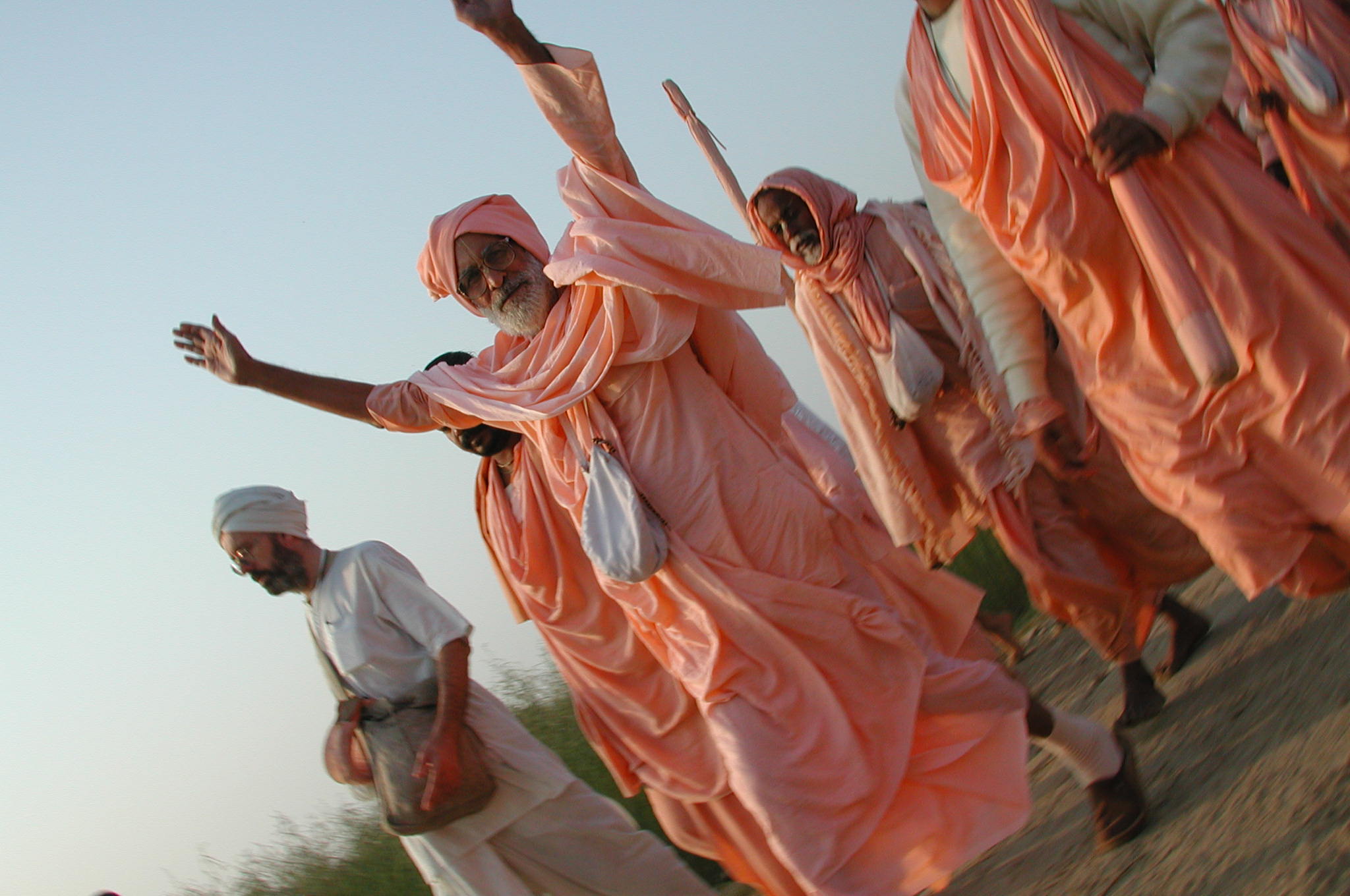Biography
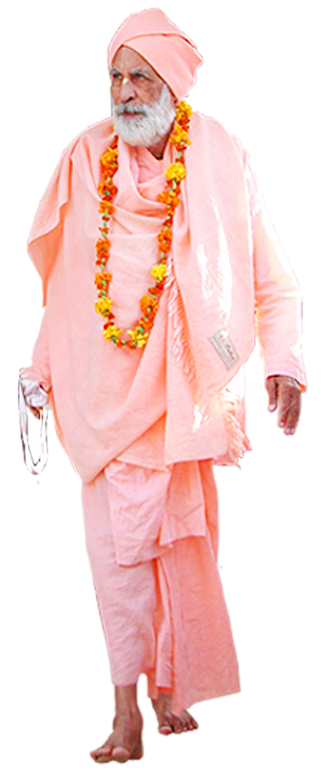
Introduction
Recognized as a pure devotee of Lord Kṛṣṇa in the line of Śrī Caitanya Mahāprabhu and as an authority on the doctrine, culture, and practices of bhakti-yoga in the Gauḍīya Vaiṣṇava tradition, His Divine Grace Śrī Śrīmad Bhaktivedānta Nārāyana Gosvāmī Mahāraja (known affectionately around the world as “Śrīla Gurudeva”) was one of the foremost disciples of the eminent Gauḍīya Vaiṣṇava ācārya, Śrī Śrīmad Bhakti Prajñāna Keśava Gosvāmī Mahāraja, a leading disciple of the great exponent of Kṛṣṇa-consciousness, Śrī Śrīmad Bhaktisiddhānta Sarasvatī Thākura Prabhupāda.
For over half a century, this bold spiritual leader and firm follower of the Vedic system of self-realization (sanātana-dharma) touched the lives of hundreds of thousands of spiritual aspirants around the globe through his engaging public lectures and compelling published writings. Although he was of an advanced age, in order to benefit the souls of the world, he circled the planet more than thirty times from 1996 to 2010, giving enlivening discourses to rapt and appreciative audiences everywhere. In 2010, he founded the International Pure Bhakti Yoga Society, whose members carry the torch of his philosophy and continue to propound his teachings worldwide.
A genuinely enlightened personality and erudite scholar, he was a prolific translator and commentator of Vedic scriptures such as Śrīmad Bhagavad-gītā and Śrīmad-Bhāgavatam, as well as Gauḍīya Vaiṣṇava texts such as Śrī Bhakti-rasāmṛta-sindhu-bindu and Śrī Jaiva-dharma. He authored over one hundred works, many of which have been translated into English, Bengali, Oriya, Spanish, French, Chinese, and more than two dozen other world languages.
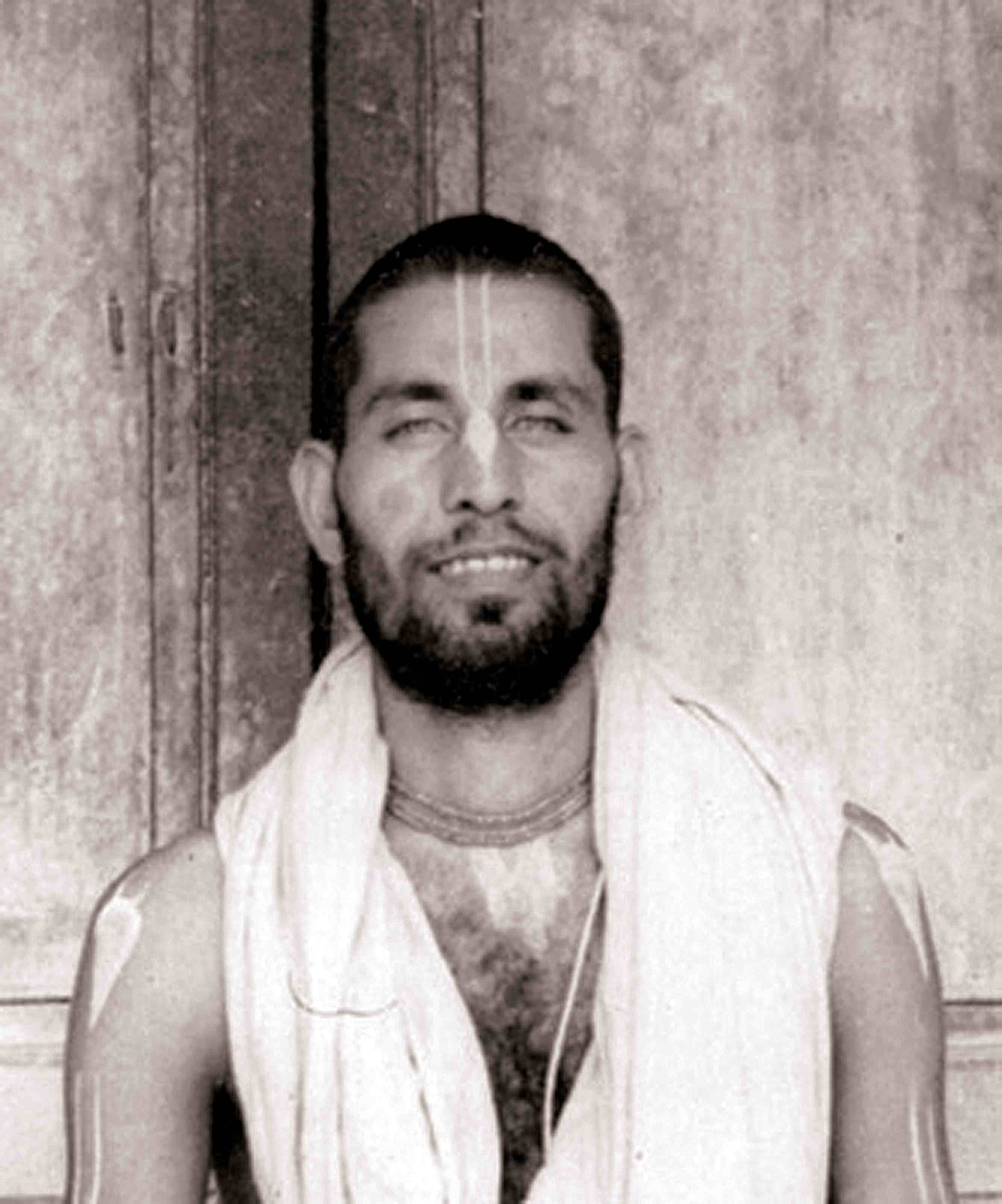
Early Life
Śrīla Nārāyaṇa Gosvāmī Mahāraja appeared in a village named Tivārīpura, located near the bank of the sacred Ganges River in the Buxar district of Bihar, India. The area is renowned as the place where Lord Śrī Rāmacandra liberated Ahalyā-devī from Gautama Ṛṣi’s curse, where Viśvāmitra Muni’s residence was situated, and where Rāma and Lakṣmaṇa killed the demoness Tāraka.
He took his divine birth on the amāvasyā (new moon) day of February 7, 1921, in a highly educated and respected brāhmaṇa family. His parents were devout Vaiṣṇavas belonging to the Śrī Sampradāya and were fully conversant with all religious principles. They named him Śrīman Nārāyaṇa.
From the time he was a baby, his father used to take him regularly to recitations of the Rāmāyaṇa, for which he had great affinity. Throughout his early years, he would accompany his father whenever he attended assemblies of kīrtana and pravacan (religious discourse) to glorify the Supreme Personality of Godhead.
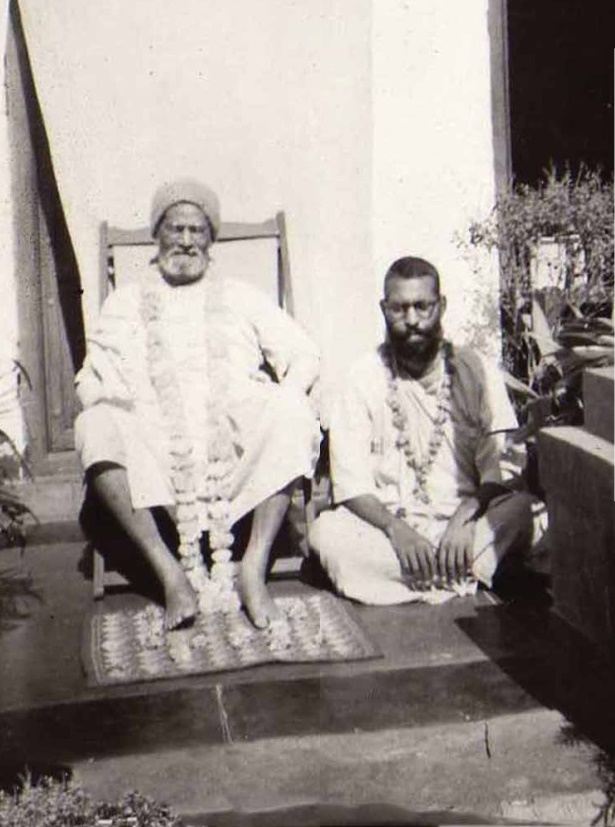
Meeting His Spiritual Master
During his boyhood, teenage years, and early adulthood, Śrīman Nārāyaṇa maintained the practice of listening to religious discourses, particularly on the subject of the Śrīmad-Bhāgavatam. Eventually he met a disciple of Śrīla Bhaktisiddhānta Sarasvatī Thākura and associate of Śrīla Bhakti Prajñāna Keśava Gosvāmī Mahāraja named Śrīla Narottamānanda Brahmacārī, who had traveled to Bihar in order to propagate the message of Śrī Caitanya Mahāprabhu there. After engaging in various discussions with the devotee, he became convinced of the paramount position of the philosophy given by ācāryas in the line of Śrīla Rūpa Gosvāmī, and within days he left home to surrender his life and join the mission.
In February 1947, he had his first meeting with his spiritual master, Śrī Śrīmad Bhakti Prajñāna Keśava Gosvāmī Mahāraja, in Śrī Navadvīpa Dhāma, West Bengal. When he arrived in Navadvīpa, the annual parikramā was under way and he joined the group. Upon its completion on Śrī Gaura Pūrṇimā, he was given both harināma and dīkṣā initiations by Śrīla Keśava Gosvāmī Mahāraja and received the name Śrī Gaura Nārāyaṇa dāsa. Soon afterward, his spiritual master also bestowed upon him the title Bhakta-bāndhava, which means “friend of the devotees,” because he was always serving the Vaiṣṇavas with affection.
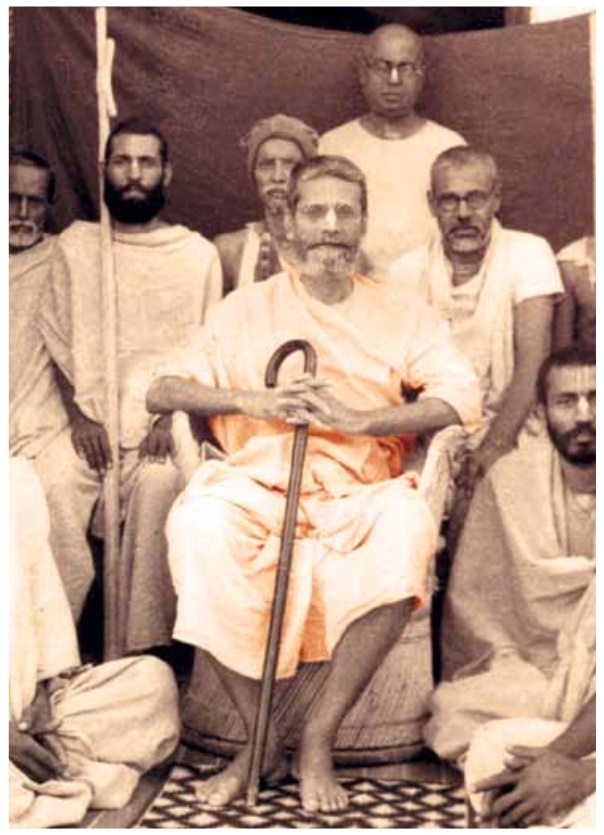
Serving the Mission of His Spiritual Master
Over the next five years, he traveled extensively with Śrīla Keśava Gosvāmī Mahāraja on preaching tours throughout India, stopping from place to place to remind people about their Vedic heritage and the teachings of Śrī Caitanya Mahāprabhu. In addition to rendering personal service to Śrīla Keśava Gosvāmī Mahāraja, he assisted with his master’s preaching. This included regularly hosting the thousands of pilgrims attending the yearly Navadvīpa-Dhāma parikramā and also the Vraja-maṇḍala parikramā, both of which, years later, would draw thousands of devotees from around the world.
Śrī Gaura Nārāyaṇa was known for his respectful and affectionate dealings with all Vaiṣṇavas, in particular with his two godbrothers, Śrī Sajjana-sevaka Brahmacārī and Śrī Rādhānātha dāsa. These three stalwart Vaiṣṇavas of the highest caliber assumed responsibility for their gurudeva’s mission in a mood of harmony and cooperation that would last the duration of their lives.
On the auspicious occasion of Śrī Gaura Pūrṇimā in 1952, Śrīla Keśava Gosvāmī Mahāraja awarded all three initiation into the sacred order of sannyāsa. Śrī Gaura Nārāyaṇa became Śrī Bhaktivedānta Nārāyaṇa Gosvāmī Mahāraja, Śrī Sajjana-sevaka Brahmacārī became Śrī Bhaktivedānta Vāmana Gosvāmī Mahāraja, and Śrī Rādhānātha dāsa became Śrī Bhaktivedānta Trivikrama Gosvāmī Mahāraja.
In 1954, his beloved gurudeva placed him in charge of managing a newly opened temple in Śrī Mathurā Dhāma named Śrī Keśavaji Gauḍīya Maṭha. Under his expert management, the maṭha prospered as the local residents came to experience the consummate care of one who is an eternal resident of Vraja. Although he spent the majority of his time in Mathurā, he would also travel to Bengal with the aim of serving his guru's mission there.
He was appointed by Śrīla Keśava Gosvāmī Mahāraja as Vice-President of his institution, Śrī Gauḍīya Vedānta Samiti, and also as Editor-in-Chief of all its Hindi publications, including a monthly periodical called Śrī Bhāgavat Patrikā. His spiritual master instructed him to render the writings of prominent Gauḍīya Vaisṇava ācāryas into Hindi, the most commonly spoken language in India and its official language. He assiduously followed this order throughout his entire life.
When not speaking hari-kathā, Śrīla Nārāyaṇa Gosvāmī Mahāraja continuously wrote books and articles. He translated and commented upon classics such as Śrīmad Bhagavad-gītā and Śrīmad Bhāgavatam, as well the books of Gauḍīya Vaiṣṇava preceptors such as Śrīla Rūpa Gosvāmī and Śrīla Bhaktivinoda Thākura. He translated many of the latter’s books from Bengali into Hindi, including the famous Jaiva-dharma and Bhakti-tattva-viveka.
After the departure of Śrīla Bhakti Prajñāna Keśava Gosvāmī Mahāraja to the spiritual world in 1968, Śrīla Nārāyaṇa Gosvāmī Mahāraja maintained responsibility for his spiritual master’s mission in his capacity as Vice-President of Śrī Gauḍīya Vedānta Samiti, acting in concert with his esteemed god-brothers, Śrī Śrīmad Bhaktivedānta Vāmana Gosvāmī Mahāraja and Śrī Śrīmad Bhaktivedānta Trivikrama Gosvāmī Mahāraja, President and Secretary of the Samiti respectively. Known as the “Three Pillars” of the Gauḍīya Vedānta Samiti, these three pure Vaiṣṇavas were tireless and fearless in their efforts to spread the uplifting message of Śrī Caitanya Mahāprabhu to all the suffering souls of this world.
While the preaching efforts of Śrīla Vāmana Gosvāmī Mahāraja and Śrīla Trivikrama Gosvāmī Mahāraja were concentrated within India, Śrīla Nārāyaṇa Gosvāmī Mahāraja began to travel abroad in 1996, thus reaching an immense Western audience. He encouraged his Western followers to faithfully practice bhakti-yoga in their respective countries but also to congregate twice a year in the holy Dhāma to perform parikramā of the pastime places of the Lord—in Navadvīpa during the week preceding Śrī Gaura Pūrṇimā and in Vṛndāvana during the month of Kārttika. Over the years, these festivals grew to achieve an attendance of over 20,000 pilgrims for Śrī Navadvīpa-Dhāma Parikramā and over 2,000 pilgrims for Śrī Vraja-maṇḍala Parikramā.
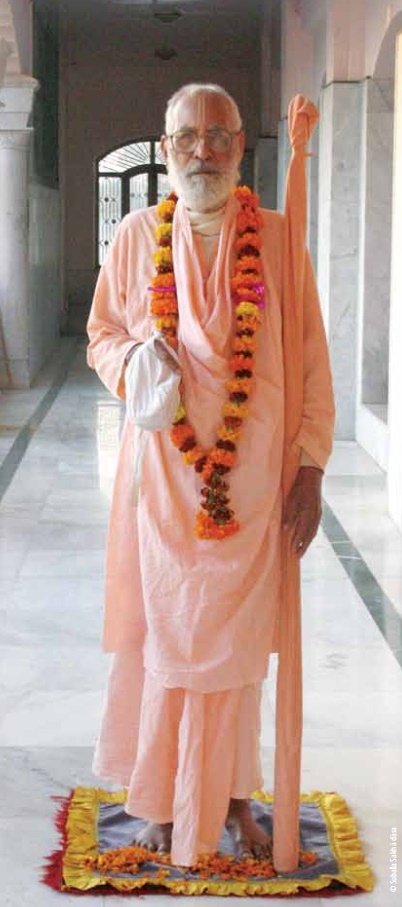
Establishing a Global Mission
Under the guidance of his spiritual master, Śrīla Nārāyaṇa Gosvāmī Mahāraja made concerted efforts to disseminate the teachings of Śrī Caitanya Mahāprabhu throughout the regions of India where Gauḍīya Vaiṣṇava philosophy was less familiar. He lectured extensively in Hindi, Bengali, and English throughout Uttar Pradesh and other parts of India, giving multiple discourses a day.
In the mid-1980s, the first Western devotees came to receive Mahāraja’s guidance and hear his hari-kathā. As he continued to spread bhakti-yoga throughout India, he became renowned as an exalted rasika Vaiṣṇava (a self-realized soul and taster of transcendental mellows), increasing the number of devotees from around the world who traveled to see him.
At their repeated request, in 1996 he ventured beyond the Indian subcontinent for the first time, initially to Europe and then to America. Traveling outside India for his preaching brought him into wider contact with an international audience. As more of his books were translated into English and other world languages, larger groups attended his lectures, often numbering in the hundreds and thousands. He inspired many of his followers to establish temples and preaching centers to assist with his mission to propagate pure bhakti-yoga.
During the next fourteen years, he circled the globe more than thirty times. Whether he was in India or abroad, his preaching always bore the distinctive characteristic of boldly clarifying the specific purposes of Śrī Caitanya Mahāprabhu’s advent, in strict adherence with the desire of Śrīla Bhaktisiddhānta Sarasvatī Thākura Prabhupāda and in perfect congruence with the conceptions of Śrīla Rūpa Gosvāmī. Thus, in upholding the glorious tenets of the sampradāya, he performed the function of a true ācārya.
In the midst of his worldwide travels, Śrīla Nārāyaṇa Gosvāmī Mahāraja maintained an exhaustive writing schedule. He had been given the responsibility by his gurudeva to translate the canon of Vedic and Gauḍīya Vaiṣṇava scriptures into Hindi, which heretofore had been bereft of these transcendental literatures. His illuminating commentary on sacred texts such as Śrī Rasa-Pañcādhyāyī, Śrī Bhakti-tattva-viveka, Śrī Rāga-vartma-candrikā, and more have been universally praised by scholars and devotees alike. By translating his works, his international followers have endeavored to make his unparalleled devotional wisdom available to the speakers of their respective languages.
For his many contributions to humanity, he received various honors from both religious and secular leaders. Notably, in 2003 he was declared Yuga-Ācārya (Ācārya of the Millennium) by the Vrajācārya Pīṭh and the World Religious Parliament in New Delhi, India. He was also given the World Peace Flame in 2001 for his selfless service to peace through the advancement of God-consciousness and named an Honorary Citizen and Goodwill Ambassador of Houston, Texas (USA).
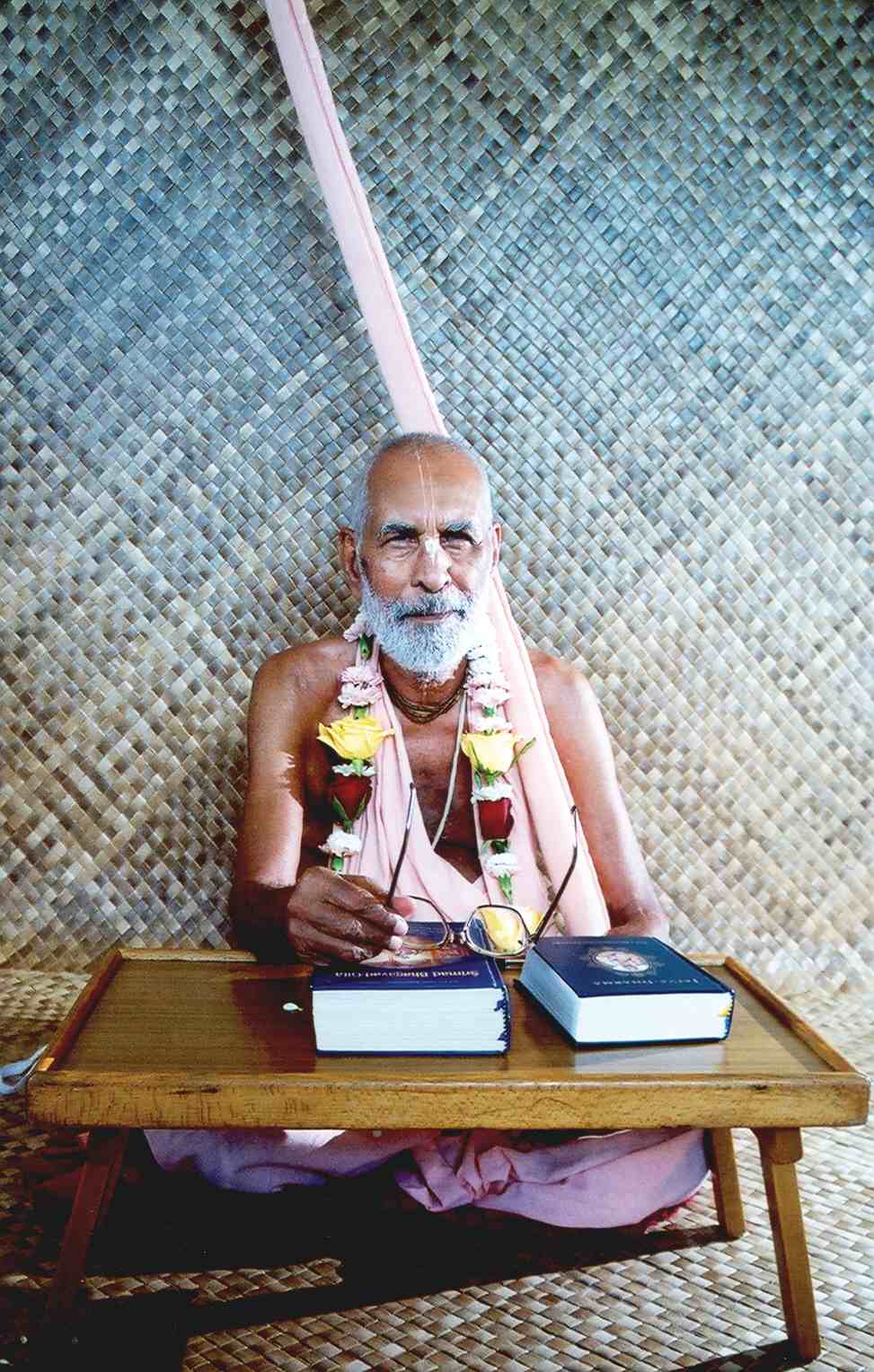
Relationship with Śrīla A.C. Bhaktivedānta Swāmī Prabhupāda
A significant relationship in the life of Śrīla Nārāyaṇa Gosvāmī Mahāraja was his association with His Divine Grace Śrīla A. C. Bhaktivedānta Swāmī Prabhupāda, the world-famous preacher of Gauḍīya Vaiṣṇavism and Founder-Ācārya of the International Society for Kṛṣṇa Consciousness (ISKCON). Śrīla Prabhupāda was a disciple of Śrī Śrīmad Bhaktisiddhānta Sarasvatī Thākura Prabhupāda and thus a dear god-brother of Śrī Śrīmad Bhakti Prajñāna Keśava Gosvāmī Mahāraja, with whom he co-founded the Gauḍīya Vedānta Samiti in 1940.
Śrīla Nārāyaṇa Gosvāmī Mahāraja first met Śrīla Prabhupāda (then known as Śrī Abhaya Caraṇāravinda Prabhu) in Kolkata in 1948 at the inauguration of a new branch of the Gauḍīya Vedānta Samiti on Ghosh Para Lane. Their association continued a few years later when Śrīla Nārāyaṇa Gosvāmī Mahāraja accompanied Śrīla Keśava Gosvāmī Mahāraja to Jhansi where Śrī Abhaya Caraṇa Prabhu had been endeavoring to start a Vaiṣṇava society called The League of Devotees.
In the early 1950s, Śrī Abhaya Caraṇa Prabhu came to reside in Śrī Keśavaji Gauḍīya Maṭha in Mathurā by the invitation of Śrīla Keśava Gosvāmī Mahāraja. Their regular devotional exchanges and deep discussions of Vaiṣṇava philosophy led Śrīla Nārāyaṇa Gosvāmī Mahāraja to develop a very intimate relationship with Śrī Abhaya Caraṇa Prabhu, regarding him both as his senior and superior, as well as his friend.
In 1959, Śrīla Keśava Gosvāmī Mahāraja initiated Śrī Abhaya Caraṇa Prabhu into the sacred order of sannyāsa, giving him the name and title Śrī Śrīmad Bhaktivedānta Swāmī Mahāraja. The Vedic fire yajña ceremony and other rituals were performed by Śrīla Nārāyaṇa Gosvāmī Mahāraja.
While Śrīla Prabhupāda resided in Vṛndāvana—first at Śrī Vaṁśī-Gopāla Mandira and a few years later at the famous Śrī Śrī Rādhā-Dāmodara Mandira—Śrīla Nārāyaṇa Gosvāmī Mahāraja visited him often. They would cook together, honor prasāda together, and have intimate discussions on Vaiṣṇava philosophy together.
After Śrīla Prabhupāda went to America and succeeded in starting the first Rādhā-Kṛṣṇa temple there, Śrīla Nārāyaṇa Gosvāmī Mahāraja sent the first mṛdaṅga drums and karatālas (hand cymbals) to him to be used for saṅkīrtana. Śrīla Prabhupāda maintained regular correspondence with Śrīla Keśava Gosvāmī Mahāraja and Śrīla Nārāyaṇa Gosvāmī Mahāraja until 1968 when Śrīla Keśava Gosvāmī Mahāraja departed from this world and entered nitya-līlā (the eternal pastimes of Śrī Śrī Rādhā-Kṛṣṇa). Thereafter, he continued to write to Śrīla Nārāyaṇa Gosvāmī Mahāraja until his own divine departure.
Toward the end of his sojourn in this world, Śrīla Prabhupāda personally requested Śrīla Nārāyaṇa Gosvāmī Mahāraja to kindly give his association to his Western disciples and help them to understand the deep truths of Gauḍīya Vaiṣṇava philosophy in the line of Śrīla Rūpa Gosvāmī. Śrīla Nārāyaṇa Gosvāmī Mahāraja humbly agreed to honor his request, considering Śrīla Prabhupāda to be one of his worshipable śikṣā (instructing) gurus.
Śrīla Prabhupāda also requested Śrīla Nārāyaṇa Gosvāmī Mahāraja to take complete charge of performing all the rituals for his samādhi ceremony after his departure. Both of these requests by Śrīla Prabhupāda clearly demonstrated the firm and absolute confidence that he held in Śrīla Nārāyaṇa Gosvāmī Mahāraja.
For the three-decade period following Śrīla Prabhupāda’s departure in November 1977, Śrīla Nārāyaṇa Gosvāmī Mahāraja unwaveringly carried out the his final request by providing loving shelter and insightful guidance to his disciples and followers. He helped these devotees to develop a more esoteric understanding of Śrīla Prabhupāda’s books and teachings and thus dive deeper into the mellows of devotion.
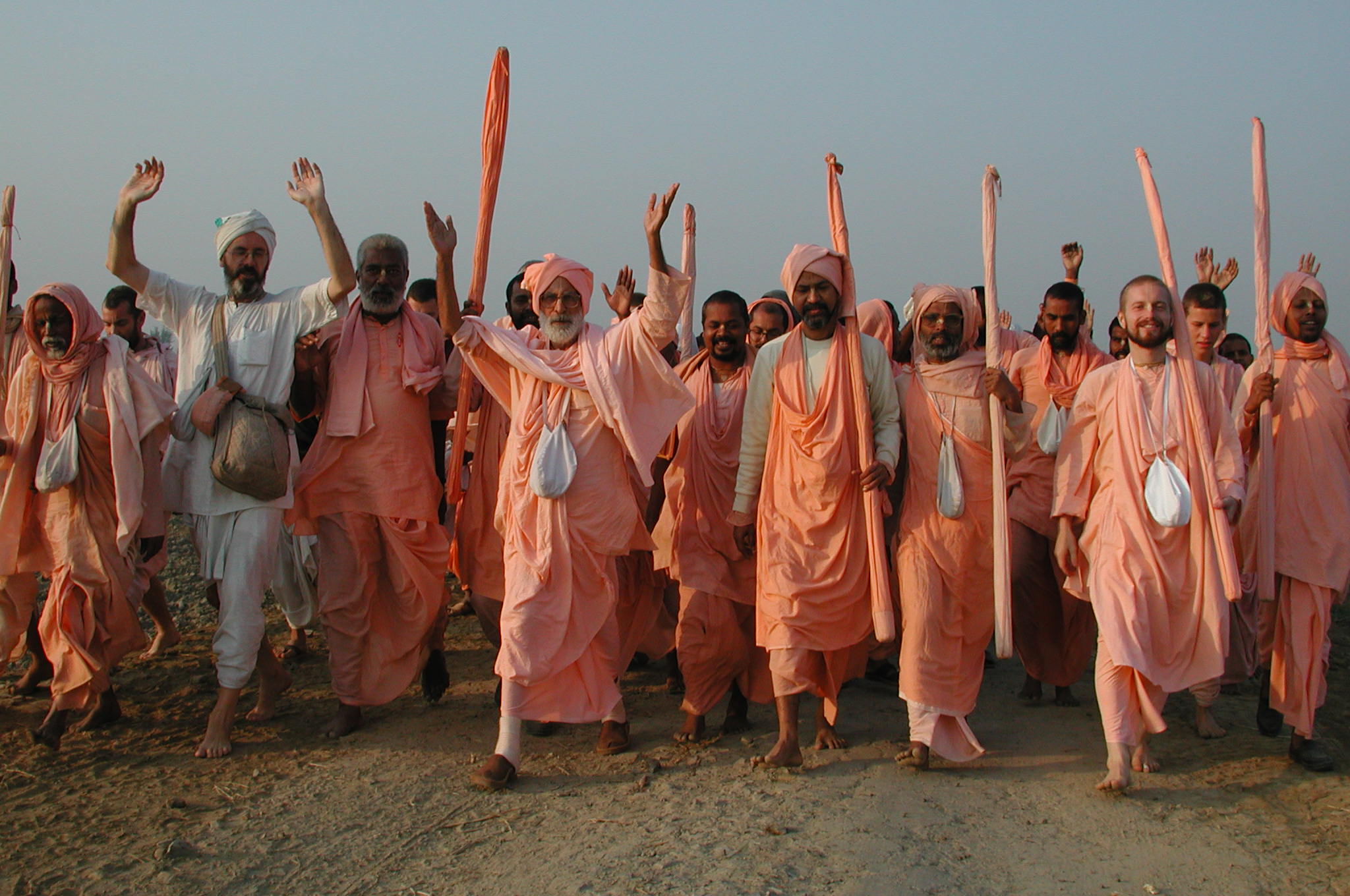
Final Pastimes
Toward the conclusion of his manifest pastimes on this earth, Śrīla Nārāyaṇa Gosvāmī Mahāraja went to Śrī Kṣetra Dhāma (Purī), the transcendental residence of Śrī Jagannātha Deva, Śrī Baladeva, and Śrīmatī Subhadrā Devī, and the sacred place where Śrī Caitanya Mahāprabhu enacted His final pastimes of deep separation from the Lord. There, he remained in constant internal absorption upon the Divine Couple.
On Wednesday, December, 29, 2010, shortly before dawn on the auspicious Kṛṣṇa-navamī-tithi of the month of Nārāyaṇa (Pauṣa), which was also the occasion of the holy appearance day of his dear god-brother, Śrī Śrīmad Bhaktivedānta Vāmana Gosvāmī Mahāraja, he who was a one-pointed follower of Śrīla Rūpa Gosvāmī, he who was the crown jewel of rasika Vaiṣṇavas in present times, and he who was acclaimed Yuga-Ācārya, oṁ viṣṇupada paramahaṁsa aṣṭottara-śata Śrī Śrīmad Bhaktivedānta Nārāyaṇa Gosvāmī Mahāraja by his own sweet desire entered Śrī Śrī Rādhā-Ramaṇa-Bihārījī’s naiśa-līlā (night pastimes) in the Lord’s own eternal abode, thus submerging those servants who had taken shelter at his lotus feet in an ocean of intense separation from him.
His transcendental form is enshrined near the bank of the holy Ganges River within Śrī Navadvīpa Dhāma, the sacred birthplace of Śrī Caitanya Mahāprabhu.
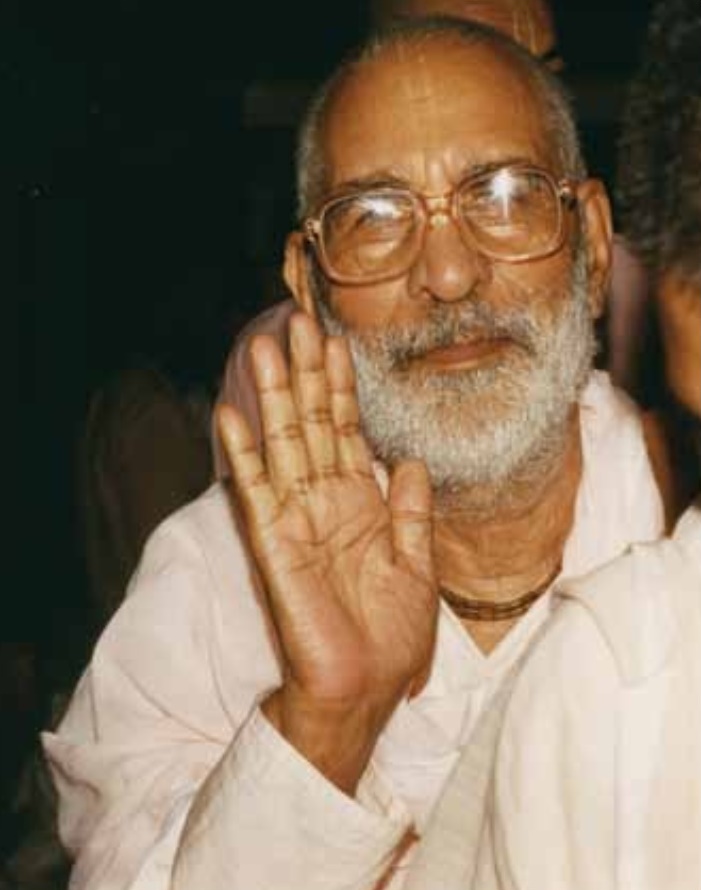
Legacy
In the illustrious life of Śrī Śrīmad Bhaktivedānta Nārāyaṇa Gosvāmī Mahāraja, one finds the archetype of pure devotion.He exemplified the authentic, unalloyed life of utter dedication and loving service to his spiritual master, to Śrīman Mahāprabhu, and to the Divine Couple, Śrī Śrī Rādhā-Kṛṣṇa. Śrīla Nārāyaṇa Gosvāmī Mahāraja, as Their intimate servitor, illuminates the path for those who wish to discover and dive deep into the ecstatic ocean of Rādhā-dāsyam (service to the radiantly beautiful lotus feet of Śrī Kṛṣṇa's dearly beloved, Śrīmatī Rādhikā).Through the media of his books, recorded lectures, and personally trained preacher-scholars, he continues to give his purifying association and divine realizations to sincere seekers of truth all over the globe.
Publications
Śrīla Nārāyaṇa Gosvāmī Mahāraja was an acclaimed scholar of Sanskrit, Hindi, and Bengali. He wrote prolifically and published over a hundred original Hindi texts or translations of various scriptures from the Gauḍīya Vaiṣṇava canon. The following is a partial list of the English translations of his books along with a few original compilations based upon his lectures or shorter articles. These books have been translated into dozens of world languages.
· Ācārya Kesarī: Śrī Śrīmad Bhakti Prajñāna Keśava Gosvāmī – His Life and Teachings
· Arcana-Dīpikā – The Light which Illuminates the Process of Deity Worship
· Beyond Liberation
· Bhagavad-gītā
· Bhajana-rahasya
· Bhakti-rasāmrta-sindhu-bindu
· Bhakti-rasāyana – The Nectar Tonic of Pure Devotion
· Bhakti-tattva-viveka – Deliberation Upon the True Nature of Devotion
· Brahma-saṁhitā
· Brhad Bhāgavatamṛta Vol. 2
· Butter Thief
· Caitanya Mahāprabhu - The Original Form of Godhead
· Camatkāra-candrikā - A Moonbeam of Complete Astonishment
· Daily Kirtana Handbook
· Dāmodarāṣṭakam
· Discerning the True Sentiments of the Soul
· The Distinctive Contribution of Śrī Rūpa Gosvāmī
· Maharṣi Durvāsā & Śrī Durvāsā-āśrama
· Essence of All Advice
· Essence of Bhagavad-gītā
· Fearless Prince
· Five Essential Essays: Refuting Common Misconceptions in Our Vaiṣṇava Community Today
· Gauḍīya Gīti-guccha
· Gaura-vāṇī Pracāriṇe
· Speciality of the Gift of Śrī Caitanya Mahāprabhu
· Śrī Gītā-govinda
· Going Beyond Vaikuntha
· Gopī-gītā - The Gopīs’ Song of Separation
· Guru-devatātmā
· Harināma Mahā-mantra
· Harmony
· Hidden path of Devotion
· I Am Spirit
· Impressions of Bhakti
· Jagannātha Ratha-yātrā
· Jaiva-Dharma
· Journey of the Soul
· Kṛṣṇa - Lord of Sweetness
· Kṛti-ratna – Jewel Among Guru-sevakas
· Letters from America
· Life of Humble Service
· Mādhurya Kādambinī
· Manaḥ-śikṣā
· My Śikṣā-guru & Priya-bandhu
· Namācārya Śrīla Haridāsa Thākura
· Navadvīpa-Dhāma Māḥātmya
· Navadvīpa Pocket Guide
· Navadvīpa-Dhāma and the Prominent Holy Places of the Gauḍīya Vaiṣṇavas in Śrī Gauḍa-maṇḍala
· Nectar of Govinda-līlā
· Our Eternal Nature
· Pinnacle of Devotion
· Prabandhāvalī
· Prema-Pradīpa
· Prema Sampuṭa – The Treasure Chest of Pure Transcendental Love
· Rādhā Kṛṣṇa Gaṇoddeśa-dīpikā
· Śrī Rādhā Our Supreme Shelter
· Rāga-vartma-candrikā – A Moonbeam to Illuminate the Path of Spontaneous Devotion
· Rāya Rāmānanda Saṁvāda
· Saṅkalpa-kalpadrumaḥ
· Secret Truths of the Bhāgavatam
· Secrets of the Undiscovered Self
· Śikṣāṣṭaka
· Śiva Tattva
· Śrī Ślokāmṛta-bindu
· Soul of Book Distribution
· Svarūpa of the Jīva
· Ujjvala-nilamaṇi-kiraṇa
· Upadeśāmṛta – The Ambrosial Advice of Śrī Rūpa Gosvāmī
· Utkalikā-vallarī
· Vaiṣṇava-siddhanta-mālā
· Veṇu-gītā – The Song of Kṛṣṇa’s Flute
· Vraja-Maṇḍala Parikramā
· Way of Love
· When Kindness and Compassion Take a Form
· 2007 Walking with a Saint – Morning Walks & Darśanas
· 2008 Walking with a Saint – Morning Walks & Darśanas
· 2009 Walking with a Saint – Morning Walks & Darśanas
· 2010 Walking with a Saint – Morning Walks & Darśanas
To Learn More About Śrīla Gurudeva
· Official Website of Śrīla Bhaktivedānta Nārāyaṇa Gosvāmī Mahāraja
· Online Library of Books by Śrīla Bhaktivedānta Nārāyaṇa Gosvāmī Mahāraja (Contains Translations in Varous Languages)
· Online Library of Audio and Video Recordings by Śrīla Bhaktivedānta Nārāyaṇa Gosvāmī Mahāraja
· Website Dedicated to the Distribution of Books by Śrīla Bhaktivedānta Nārāyaṇa Gosvāmī Mahāraja
